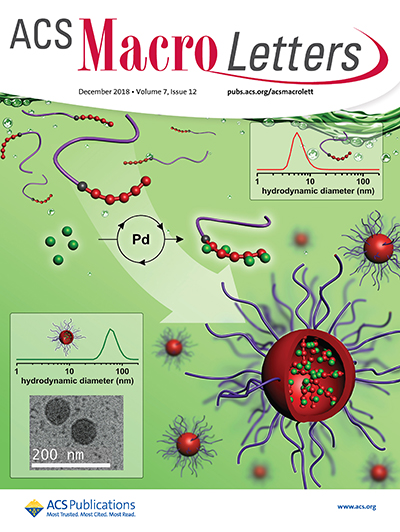 Reprinted with permission from “Functionalization-Induced Self-Assembly of Block Copolymers for Nanoparticle Synthesis” David H. Howe, James L. Hart, Riki M. McDaniel, Mitra L. Taheri, and Andrew J. D. Magenau, ACS Macro Letters 2018 7 (12), 1503-1508. Copyright (2018) American Chemical Society.
Reprinted with permission from “Functionalization-Induced Self-Assembly of Block Copolymers for Nanoparticle Synthesis” David H. Howe, James L. Hart, Riki M. McDaniel, Mitra L. Taheri, and Andrew J. D. Magenau, ACS Macro Letters 2018 7 (12), 1503-1508. Copyright (2018) American Chemical Society.
As recently highlighted on the cover of ACS MacroLetters, Assistant Professor Andrew Magenau’s Macromolecular Materials Group has developed an innovative approach to fabricating polymeric nanoparticles with exquisite control of particle size, shape, and chemical structure. This new technique, coined as functionalization induced self-assembly or FISA, offers an exciting opportunity for understanding fundamental aspects of polymer science, in addition to serving as a powerful means for developing advanced and highly-tailorable nanostructures for several important applications.
The FISA process, spearheaded by PhD student David Howe, occurs by selectively attaching guiding molecules to one end of a polymer chain (i.e., a large macromolecule resembling a string-of-pearls) that help to direct their organization into “self-assembled” nanoparticles. Of greatest importance though, is FISA’s potential for synthesizing nanoparticles of vast chemical diversity, making it an attractive tool for targeted drug delivery or nanoreactor technology (i.e., nano-scaled chemical factories for efficient, rapid, and streamlined syntheses), where precise control of chemical composition is essential.